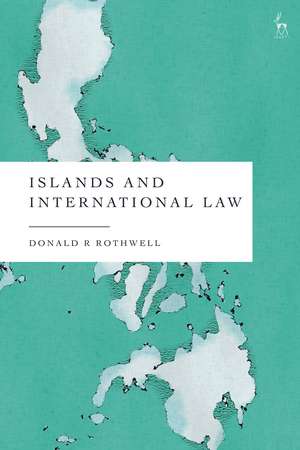Islands and International Law
Autor Donald R Rothwellen Limba Engleză Paperback – 24 ian 2024
| Toate formatele și edițiile | Preț | Express |
|---|---|---|
| Paperback (1) | 300.33 lei 43-57 zile | |
| Bloomsbury Publishing – 24 ian 2024 | 300.33 lei 43-57 zile | |
| Hardback (1) | 542.12 lei 43-57 zile | |
| Bloomsbury Publishing – 13 iul 2022 | 542.12 lei 43-57 zile |
Preț: 300.33 lei
Preț vechi: 366.15 lei
-18% Nou
Puncte Express: 450
Preț estimativ în valută:
57.47€ • 60.16$ • 47.55£
57.47€ • 60.16$ • 47.55£
Carte tipărită la comandă
Livrare economică 07-21 aprilie
Preluare comenzi: 021 569.72.76
Specificații
ISBN-13: 9781509955466
ISBN-10: 1509955461
Pagini: 330
Dimensiuni: 156 x 234 x 25 mm
Greutate: 0.46 kg
Editura: Bloomsbury Publishing
Colecția Hart Publishing
Locul publicării:London, United Kingdom
ISBN-10: 1509955461
Pagini: 330
Dimensiuni: 156 x 234 x 25 mm
Greutate: 0.46 kg
Editura: Bloomsbury Publishing
Colecția Hart Publishing
Locul publicării:London, United Kingdom
Caracteristici
First book length study on public international law as it relates to islands
Notă biografică
Donald R Rothwell is Professor of International Law at the Australian National University, Canberra, Australia.
Cuprins
Introduction 1. Islands: Geography and Law I. Introduction II. Islands and Geography III. Islands and Juridical Classification IV. Conclusions 2. Artificial Islands I. Introduction II. Scope and Location of Artificial Islands III. Historical Legal Framework IV. Early State Practice V. LOSCVI. Contemporary State Practice VII. Artificial Islands, Rocks and Land Reclamation VIII. Conclusions 3. Islands and Territoriality I. Introduction II. International Law and Territoriality III. Islands and Territoriality IV. Current State of the LawV. Contemporary Island Territorial Disputes VI. Conclusions 4. Islands, Status and StatehoodI. Introduction II. Islands and the International System III. Chapter XI Non-Self-Governing Territories and Chapter XII Trust TerritoriesIV. Current Status of Islands V. Special Regimes VI. Conclusions5. Archipelagic States I. Archipelagos and International Law II. Early Legal Developments III. UNCLOS I IV. The Indonesian and Philippines Claims V. UNCLOS III VI. The LOSC and Archipelagic States VII. Archipelagic State Entitlements VIII. Conclusions 6. Dependent Archipelagos I. Introduction II. Characterisation III. Baselines IV. Maritime Entitlements V. State Practice VI. Conclusions 7. Islands and Maritime Entitlements I. Introduction II. Baselines III. Historic Waters IV. Bays V. Internal Waters VI. Territorial Sea and Contiguous Zone VII. Continental Shelf VIII. Exclusive Economic Zone IX. Conclusions 8. Islands and Maritime Boundaries I. Introduction II. Overview of Maritime Boundary Delimitation III. Decisions of International Courts and Tribunals IV. State Practice V. Impact of Islands on Maritime Boundary Delimitation VI. Conclusions 9. Islands and Human Rights I. Introduction II. Human Rights Treaties and Islands III. Human Rights Issues and Islands IV. Self-Determination V. Small Island Developing States VI. Conclusions 10. Islands and Sea-Level Rise I. Introduction II. Climate Science III. Islands and Artificial Islands IV. Status and Territoriality V. Archipelagic States VI. Maritime Entitlements and Maritime Boundaries VII. Human RightsVIII. Conclusions 11. A Regime of Islands? I. Introduction II. Regimes, Islands and International Law III. Fragments of a Regime of Islands IV. A Future Regime of Islands
Recenzii
It has to be said that the production of this book was a commendable achievement, giving a broad and contemporary insight into insular issues in international law, and that overall the book is well researched and produced.
